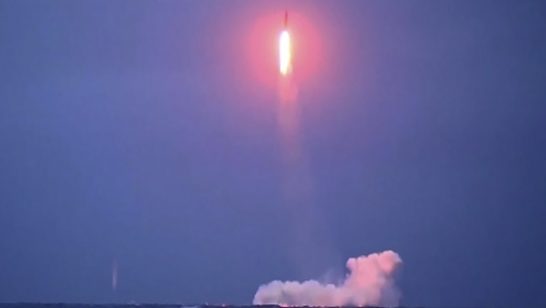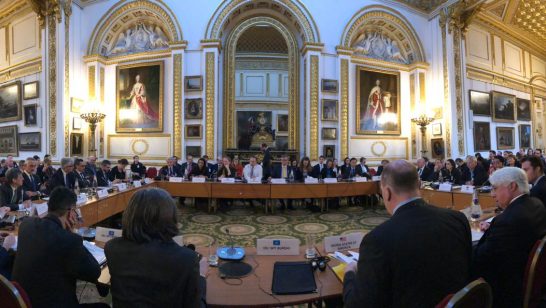The ELN’s work on the P5 Process has focused in recent years on the call for the P5 states to set up a working group to advance strategic risk reduction. Among our recommendations, we have encouraged all five of the states to jointly affirm that a nuclear war cannot be won and could never be fought. This statement is known as the Reagan-Gorbachev formula because these two leaders affirmed this as they began to agree on vital arms control architecture during the Cold War.
In January 2021, the P5 leaders made this vital affirmation together for the first time. In a joint statement on preventing nuclear war and avoiding arms races, they stated clearly that “a nuclear war cannot be won and must never be fought”. They have also endorsed the reduction of strategic risks as one of the P5’s foremost responsibilities, reaffirmed their obligations under Article 6 of the Non-Proliferation Treaty, and have pledged to seek diplomatic approaches to avoid military confrontations and prevent an arms race.
As a joint statement by all five leaders, this is unprecedented. It came despite heightened geopolitical tensions between the P5 countries, which have made this kind of multilateral diplomacy more difficult but all the more necessary.
Why does this matter?
The P5 statement reaffirming the Reagan-Gorbachev formula is fertile ground to build on to advance much-needed work on preventing nuclear war, primarily through the lens of strategic risk reduction.
The affirmation has resonance because the statement Reagan and Gorbachev made in 1985 was a key confidence-building declaration that helped pave the way for significant arms control agreements during and after the Cold War.
As much of this arms control architecture has been eroded in recent years, there has been added concern that Russia and the US seemed unwilling to reiterate the simple yet powerful truth that a nuclear war cannot be won and must never be fought, and that other nuclear powers were also unwilling to affirm this.
For that reason, some experts in the field view the statement with scepticism and argue the P5 lack credibility because they will continue to pursue an arms race. The ELN has supported this statement not as an end but as an opening for much-needed concrete actions to reduce strategic and nuclear risks.
That it should happen at a time when the P5 are struggling to agree on much at all is particularly important.
How did it happen? Diplomacy, debates and the ELN’s advocacy
The ELN has consistently supported the P5 states’ participation in a multilateral dialogue intended to reduce the risks of nuclear war. This has specifically taken place through the P5 Process, an informal dialogue between the “nuclear five”, which was founded by the ELN’s Chair Lord Des Browne during his time as UK defence minister.
The ELN has been involved in a sustained track 1.5 dialogue around the P5 Process, under both the UK and French chairmanships, working in partnership with King’s College London (KCL) in the UK and the Foundation for Strategic Research (FRS) in France. This dialogue built new connections between civil society and officials, has injected ideas from the expert community into official thinking, and has been described by the French ambassador to the Conference on Disarmament, Yann Hwang, as “innovative… an excellent initiative with a lot of results” (in an FRS webinar, 18 mins and 50 seconds in).
One of the recommendations the ELN has made as part of this process was for a joint P5 reaffirmation of Reagan-Gorbachev. China has called for it for several years, and Russia said it had asked Trump to reaffirm it jointly with Putin in 2018.
In 2020, as the Covid-19 pandemic brought in-person diplomacy to a halt and forced the postponement of the NPT RevCon, the ELN moved to a model of intensive virtual convening under its “Go Big” initiative. This produced three intergeneration Action Groups, each focused on a specific, time-bound, achievable policy ask.
Among these three priority groups was the P5 Action Group, chaired by senior network members Ahmet Üzümcü and Goran Svilanovic, with Policy Fellow Max Hoell as the staff lead, which convened practitioners and experts with diverse perspectives on the responsibilities of the P5 nuclear states for a bridge-building dialogue, and identified constructive common ground in the form of the 2020 group statement on P5 strategic risk reduction, signed by 141 ELN members. In particular this called for a P5 working group to carry out a sustained dialogue committed to preventing nuclear weapons use.
After the US and Russia renewed New START in 2021, the ELN and other leadership groups called for them to take further measures to safeguard against the risk of nuclear war. As co-convenor of the Euro-Atlantic Security Leadership Group (EASLG), the ELN’s chair jointly produced and signed a detailed 2021 statement and recommendations on advancing strategic stability, which was backed up by direct engagement with senior policymakers. It proposed eight steps for global security leaders to take to manage instability and build mutual security, including an affirmation of the Reagan-Gorbachev principle as a first step to signal their commitment and act as a foundation for practical steps.
In 2021, President’s Biden and Putin jointly affirmed Reagan-Gorbachev. Shortly afterwards, President’s Putin and Xi did the same. ELN members and partners welcomed these moves. But the question of whether the P5 would make such a statement – especially at leader level –continued to hang in the balance. Even after Biden, Putin and Xi affirmed the statement, the UK and France continued to have doubts. Explanations from diplomats varied. Some said that it was already self-evident (in which case, why not say it?), while others argued that such a statement would unnecessarily constrain nuclear policy.
The ELN, therefore, advocated for the specific importance of a joint P5 statement and emphasised the problematic nature of the UK and France holding out on this constructive agreement. This final push included:
- Our June 2021 joint statement by leadership groups, with the EASLG co-convenors, APLN and The Elders, which built on the momentum of the Biden-Putin and Biden-Xi affirmations to call on the whole P5 to affirm a nuclear war cannot be won and must never be fought;
- High-level private diplomacy, including a private letter to President Macron in December 2021 signed by ELN members from across Europe;
- A creative digital campaign in December 2021, #ReaffirmOurFuture, in collaboration with the Nuclear Threat Initiative, Asia-Pacific Leadership Network and The Elders, used a powerful video message featuring an international and intergenerational mix of network members, as well as infographics, to connect with new audiences and amplify the importance of the Reagan-Gorbachev message.
- Among those who participated in the campaign was UN High Representative for Disarmament, Izumi Nakamitsu, who recorded her own video calling on every nuclear weapon state to #ReaffirmOurFuture
- Providing resources such as commentaries and op-eds to advance and inform the debate among experts and the public.
The P5 eventually agreed to make this statement just before the planned NPT RevCon. Moreover, they went ahead with it despite the RevCon’s further postponement for Covid reasons.
We and our partner organisations have welcomed the statement – and are looking now at next steps to keep up the momentum of progress on risk reduction.
What is next?
This wider multilateral statement can also help to pave the way for actions that will now be needed if the words are to have credibility.
Notably, the ELN will shortly be publishing a paper on P5 strategic risk reduction laying out ideas and possible actions for a future P5 working group on this vital issue, as a submission to the NPT RevCon. This group would need to arrive at a common understanding of strategic risks, including the possible escalation pathways that might emerge from emerging and disruptive technologies and regional security crises. Given the high stakes, the group would also need to adopt a programme of work to mitigate these risks.
We will continue to keep open the space for engagement with the P5 Process to help provide the ideas and encouragement for further progress.
The ELN’s director Adam Thomson notes:
In this charged environment, the sustained and high-level advocacy that the ELN has carried out with the key decision-makers – including your concerted efforts with the French decision-makers in December – has made a real impact. I would like to say well done to all of our members and partner organisations who have given this issue their attention and support.
Adam Thomson
Ahmet, who received the Nobel Peace Prize on behalf of the OPCW in 2013, comments that:
Every effort to reduce the risk of a nuclear explosion will serve the common interests of humanity; ourselves and future generations.
Ahmet Üzümcü
The opinions articulated above represent the views of the author(s) and do not necessarily reflect the position of the European Leadership Network or any of its members. The ELN’s aim is to encourage debates that will help develop Europe’s capacity to address the pressing foreign, defence, and security policy challenges of our time.
Image: Sahil Shah/ELN.



